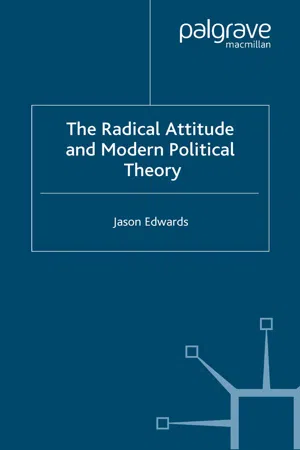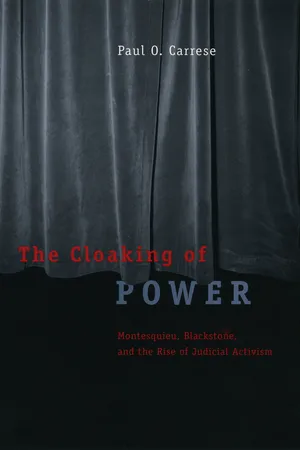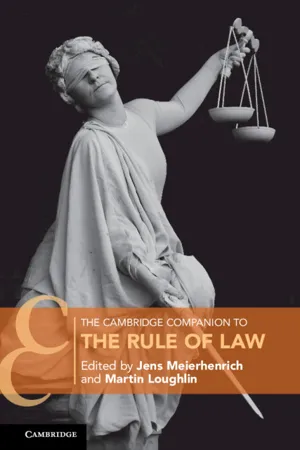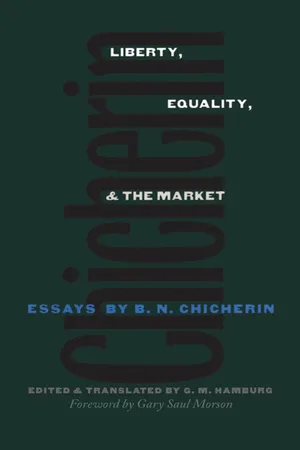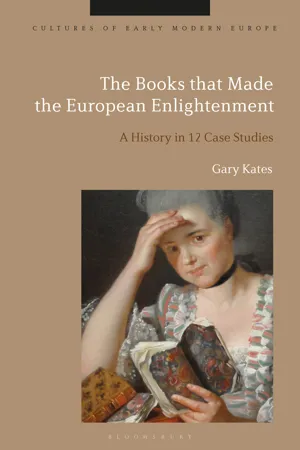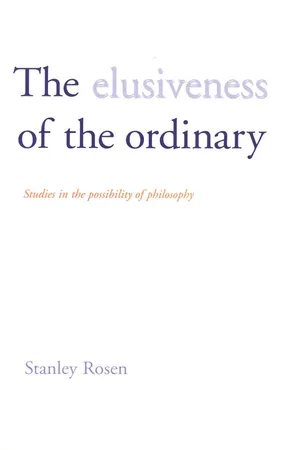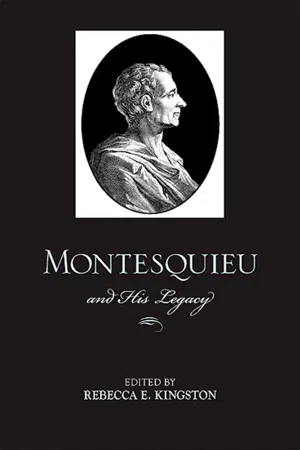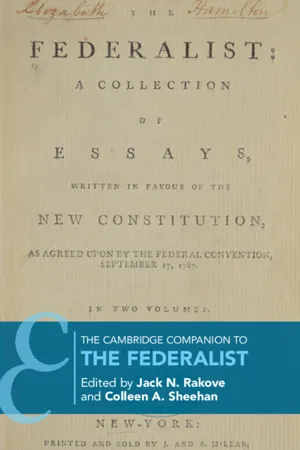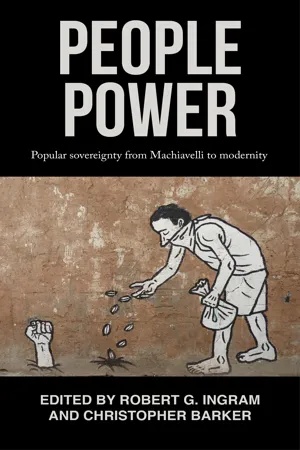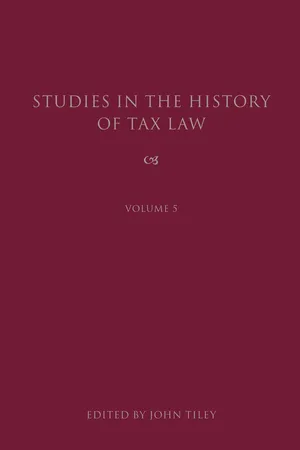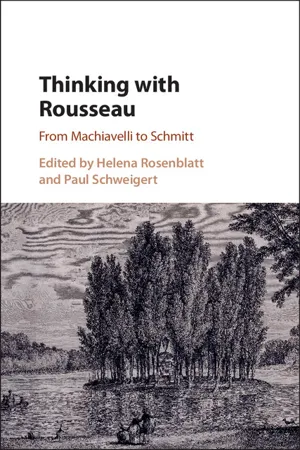Politics & International Relations
Montesquieu
Montesquieu was a French political philosopher known for his theory of the separation of powers, which greatly influenced the development of modern political systems. In his influential work "The Spirit of the Laws," he argued for a system of checks and balances to prevent the concentration of power in any one branch of government. Montesquieu's ideas continue to shape political thought and the structure of governments worldwide.
Written by Perlego with AI-assistance
Related key terms
1 of 5
11 Key excerpts on "Montesquieu"
- J. Edwards(Author)
- 2006(Publication Date)
- Palgrave Macmillan(Publisher)
The difficulty is arranging institutions and interests in such a way that they give rise to the requi- site balance between the desires of the individual man and the stability and safety of society as a whole. In chapter 6 of Book 11, Montesquieu outlines the separation of powers in the English constitution. His 76 The Radical Attitude and Modern Political Theory description of the way in which the three different ‘powers’ of govern- ment, the executive, legislative and judicial, are there exercised by dif- ferent agents, has often been understood as a major statement of his support for liberal constitutionalism. In other words, Montesquieu’s central contribution to liberal political thought is often said to be the juristic theory that the formal separation of powers in a constitution is the principal safeguard of liberty. What this thesis blindly ignores is most of what Montesquieu had written in The Spirit of the Laws up to this chapter and most of what follows after. The formal separation of powers is only established in moderate government where the social conditions for such an arrangement have already come into being. 40 As Raymond Aron points out, Montesquieu did not see the English constitution as a ‘model for all countries’, but rather the English system provided the ‘basis of a moderate and free state, as a result of the balance of social classes and political powers’. 41 Positive laws and constitutional arrangements have a concrete effect on the organisation of social life and provide the grounds for the exer- cise of liberty. But as we have seen, Montesquieu saw positive laws as the product of certain necessary conditions that gave shape to them in any particular historical setting.- eBook - PDF
The Cloaking of Power
Montesquieu, Blackstone, and the Rise of Judicial Activism
- Paul O. Carrese(Author)
- 2010(Publication Date)
- University of Chicago Press(Publisher)
PART ONE Montesquieu’s Jurisprudence and New Judicial Power After four decades as a lawyer and judge, poet and historian, scientist and philosopher, Charles de Montesquieu produced a work of political philosophy that would leave its mark on mod-ern thought and civilization. The Spirit of the Laws (1748) reflects the complexity of Montesquieu’s life and thought, his balanced portrait of the myriad phenomena of human life and the varied perspectives from which we judge politics and morals. Unlike the rationalist works of his Enlightenment predecessors, and more in the spirit of Montaigne, Montesquieu insisted on accounting for the numerous complexities in human thoughts and deeds. Unlike the more fatigued and skeptical of his late-modern and postmodern successors, he resisted the temptation of moral and political relativism. This moderate philosophy helped to make his masterwork an immediate success among both thinkers and statesmen. Later modernity has separated theory and practice, so that relatively few academics today appreciate his effort at a mu-tually instructive dialectic between the perspective of the jurist and that of the philosopher and political theorist. Similarly, few lawyers or jurists today appreciate Montesquieu’s achievement as a political philosopher and constitutionalist, or how his thought undergirds the independent courts and powerful legal professions of the past two centuries. [ 11 ] [ 12 ] Part One This larger spirit of moderation and complexity guides the gradual de-velopment of a new theory of judicial power throughout the early books of The Spirit of the Laws , which is eventually presented more clearly in the lib-eral constitutionalism of books 11 and 12. A distinctive jurisprudence and constitutionalism inform this conception of judging, and a brief comparison with both earlier liberal theory and English common-law jurisprudence con-firms that Montesquieu sought a novel synthesis of elements from these earlier schools. - eBook - PDF
- Jens Meierhenrich, Martin Loughlin(Authors)
- 2021(Publication Date)
- Cambridge University Press(Publisher)
214–218; Jean Ehrard, Politique de Montesquieu (Paris: Armand Colin, 1965), p. 35; law, 2 and if he can fairly be described as an Orientalist. 3 Yet there is little disagreement about the central role that the rule of law plays within his political thought. At the same time, the depth and originality of Montesquieu’s distinctive understanding of the rule of law has received less attention than it deserves. Three features of his view are especially significant. The first is his focus on the diverse dimensions of the rule of law as a political practice. This diversity includes institutional mechanisms such as the separation of powers, human passions such as honor and self-interest, and multiple forms of contestation across competing sites of power – economic, social, and religious as well as political. The second distinctive feature of Montesquieu’s view is the multidimensionality of law as he conceives it. For the rule of law to be in effect, political power must answer not only to law as the formally codified outputs of legislative processes but also to what Montesquieu calls “the spirit of the laws.” By this he means that power should be exercised consonant with the broader background of norms, values, and social practices that constitute a particular people’s way of life and should be consistent with natural law and the standard of natural equity. The rule of law in Montesquieu links positive law to law in these other forms. The third distinctive feature of Montesquieu’s approach is the emphasis he places on the independence of the judicial branch of government and on moderation in the content and application of civil and criminal laws. Together these features of Montesquieu’s view suggest that that the rule of law is best understood not in exclusively legalistic terms and not as the fixed backdrop of politics but as a multidimensional, dynamic political practice that must be continuously reenacted, drawing support from a broad array of sources. - eBook - PDF
- Harold Bolitho(Author)
- 1998(Publication Date)
- Yale University Press(Publisher)
Montesquieu Locke wrote about government, Montesquieu about laws. 1 His fa-mous work The Spirit of the Laws (De l'esprit des loix), published in 1742, was intended to analyze the laws governing human societies, especially those laws which safeguard liberty. This book served as the basis for the constitutional doctrine in Europe. The English constitu-tion, which developed from practice, required a theorist who could identify the general principles contained in it, thereby making it into a model for other peoples. Locke could not be such a theorist: devoting his attention elusively to the revolution that transformed his father-land before his very eyes, he dedicated himself to analyzing the origin of government and its subordination to the sovereign will of the people. But a constitution already firmly rooted and able to maintain the legal order needed another interpreter. He appeared in the person of Montesquieu. The French publicist, the finest in the modern pe-riod, showed that the relationships between branches of government, its checks and balances, were the most essential guarantee of liberty. In antiquity Polybius had presented the same teaching in his Roman history; but Montesquieu fully developed the theory in all its com-256 Montesquieu 257 plexity and linked it with general principles governing the life of nations. [Montesquieu's theory of checks and balances], of course, did not exhaust modern teaching on constitutional monarchy. Standing on the ground of individualism, Montesquieu chiefly directed his attention to guarantees of liberty while ignoring all other requirements of the state. But it was easy to correct this oversight subsequently; indeed, [later theory] has been nothing more than an elaboration of the theory of this famous eighteenth-century French writer. He laid the foundation for subsequent theory, and the founda-tion is a solid one. - eBook - ePub
The Books that Made the European Enlightenment
A History in 12 Case Studies
- Gary Kates(Author)
- 2022(Publication Date)
- Bloomsbury Academic(Publisher)
The question is a significant one, he agreed. “No political truth is certainly of greater intrinsic value.” Were the new federal government vulnerable to the types of violations charged by its opponents, “no further arguments would be necessary to inspire a universal reprobation.” Nor did Madison object to allowing Montesquieu to umpire the question. “The oracle who is always consulted and cited on this subject is the celebrated Montesquieu. . . . Let us endeavor. . . to ascertain his meaning on this point.” So, again, as with Hamilton’s Federalist 9, the terms of the debate surrounding the US Constitution boiled down to a debate over the meaning of Montesquieu’s The Spirit of the Laws. 114 Madison reminded readers that while Montesquieu developed his separation of powers doctrine wholly within the context of Great Britain, it was clear to everyone that the branches of the English government were not, in fact, “separate and distinct from each other.” The prime minister, for example, is the leader of the House of Commons; judges are appointed by the king; members of the House of Lords are also named by the king. This being obvious, argued Madison, Montesquieu could not possibly have meant, argued Madison, that “these departments ought to have no partial agency in, or no control over, the acts of each other.” Rather, his principle was designed to prevent “the whole power” of one branch falling into “the same hands which possess the whole power of another” branch. For example, “if the king, who is the sole executive magistrate, had possessed also the complete legislative power,” liberty would evaporate. So, while whole power leads to tyranny, partial power acts to temper and check the arbitrary tendencies of any one branch. Here was the crux of the matter - eBook - PDF
The Elusiveness of the Ordinary
Studies in the Possibility of Philosophy
- Stanley Rosen(Author)
- 2008(Publication Date)
- Yale University Press(Publisher)
This is hard to distinguish from traditional conser-vatism. The early Enlightenment is thus for Montesquieu the wrong time to in-troduce radical political changes because European constitutions are suffi-ciently good that one runs the risk of replacing them with something worse. Change is desirable only when prevailing conditions are marked by ignorance and manifest deficiencies. Montesquieu thus claims that he would like to give reasons to all citizens “to love their duties, their prince, their country, their laws,” and an augmentation of knowledge to each ruler concerning what he ought to prescribe. In general, he would be the happiest of mortals if he could free humankind of its preju-dices, namely, “that which makes one ignorant of oneself.” Montesquieu tends to downplay the practical consequences of what is ostensibly a work of pure theory, not only to avoid conflict with the authorities but because he disap-proves of radical change. His aims are nevertheless not only theoretical but philanthropic. Montesquieu says: “It is in attempting to instruct human beings that one may practice that general virtue which includes the love of all. Man, that flexible being, submitting in society to the thoughts and impressions of others, is equally capable of understanding his own nature whenever one points it out to him, and of losing even the sentiment of it when one conceals it from him” ( ). It is the very “flexibility” of human beings that separates politics from physics and makes it impossible to write a purely theoretical study of politics. If human nature may be concealed, is this not the practical equiva-lent to the admission that it may be changed? As an infant without a mother Politics and Nature in Montesquieu 27 (the Latin epithet prolem sine matre creatam follows the title) who also says of himself io anche son pittore (“I too am a painter”), Montesquieu is not only aware of but prides himself upon his originality. - eBook - PDF
- Rebecca E. Kingston(Author)
- 2008(Publication Date)
- SUNY Press(Publisher)
The numbers yielded by this study are modest: from 1997 to 2003, they range from 17 to 45 references annually. Voltaire performed at least twice as well during the same time period. Nevertheless, the results for Montesquieu are not without interest. First, because they are due to two sorts of texts in Le Monde: the “Debates/Analysis” section and “Reader’s Mail.” Second, because of the nature of the questions in which his name is implicated: the political-financial “affairs” that all too often disquiet or scandalize public opinion, while reminding, a contrario, of the Republic’s need for virtue; the tax system in relation to freedom; the construction of the European Union and federal- ism; globalization and the World Trade Organization (WTO); French political institutions, be it a question of the legitimacy of the Senate and bicameralism, the rejection of direct democracy by fear of populism, or the preeminence of the Constitutional Council, whose mission is to safeguard the “spirit of the law”; and especially the balance of powers—often mistakenly referred to as the “separation of powers”—including the consideration of three other powers, in addition to the three analyzed by Montesquieu, which he could not have known: the power of science, the power of technology, and the power of the media; and finally, the functioning of the judicial system and the relations between the Office of the Public Prosecutor and the Ministry of Justice. We will return to this last point below. Let us also mention two major issues that go far beyond the borders of the Hexagon: the relationship between political liberalism and economic liberalism and the place that the population of foreign origin occupies in a nation, on which subject Montesquieu’s universalism is set against Le Pen. - eBook - PDF
- Jack N. Rakove, Colleen A. Sheehan(Authors)
- 2020(Publication Date)
- Cambridge University Press(Publisher)
15 No one did more to shape American thinking with respect to the constitution of liberty in modern times. For Montesquieu’s preeminence, there was an obvious reason. His Spirit of Laws, which first appeared in English two years after its publication in French, is arguably the greatest work in constitutional prudence penned in modern times, and almost instantly it was recog- nized as such. In 1749 David Hume informed its author that his book would be “the wonder of the centuries.” 16 Two years later, in his Enquiry Concerning the Principles of Morals, he alerted the public to the fact that Montesquieu was “an author of great genius, as well as . extensive learning,” and he described The Spirit of Laws as “the best system of political knowledge that, perhaps, has ever yet been com- municated to the world.” 17 In 1750, in his correspondence, Horace Walpole described that work as “the best book that ever was writ- ten.” 18 Seven years later, in his Abridgment of English History, Edmund Burke hailed its author as “the greatest genius, which has enlightened this age.” 19 Not since Aristotle composed The Politics had anyone so thoroughly surveyed the variety of polities to be found in the known world, examined the conditions under which they thrived, and pondered their virtues, vices, and propensities. 20 Moreover, Montesquieu took as his principal theme political liberty, understood in terms of the rule of law and the provision for individual security, and the institutions and circumstances conducive to its flourishing, and he singled out as a form of government that had liberty as its direct object the very polity from which the American colonists derived their own institutions. What James Madison said on this subject in Federalist 47 was an exaggeration, but there was none- theless something to the claim: The British constitution was to Montesquieu, what Homer has been to the didactic writers on epic poetry. - eBook - ePub
People power
Popular sovereignty from Machiavelli to modernity
- Robert Ingram, Christopher Barker, Robert G. Ingram, Christopher Barker(Authors)
- 2022(Publication Date)
- Manchester University Press(Publisher)
The Spirit of the Laws, Montesquieu distinguished and analysed three types of political regimes: monarchies, despotisms and republics. In monarchies and despotisms, Montesquieu argued, a single individual rules. In republics, either the few rule (i.e. aristocracy) or the many rule (i.e. democracy). Therefore, in all three forms of government, one power stands decisively above the rest.Nor is this contradicted by Montesquieu’s virulent condemnation of despotism, for Montesquieu differentiated republics and monarchies from despotisms without thereby denying that they also contain a summa potestas. What distinguishes the two moderate regimes from a despotism is that in them, the summa potestas is constituted by law. In a republic, the law that achieves this is the electoral law: the law determining who is allowed to vote, how the voting will take place, how the electorate is divided into different sections.20 Absent such a law, a republic simply does not have a sovereign, for there is no clearly defined and constituted people. In monarchies, a parallel function is served by the law of monarchical succession,21 which had been the subject of historical and theoretical speculation in France for nearly a millennium. During the eighteenth century, when Montesquieu was writing, it was generally agreed that the Crown must pass to the next male French Catholic heir. As sovereign as the king was, he could not make his daughter or friend the next monarch.22In contrast with these regimes, under despotism there is no legal structure that determines who holds the highest power: sovereignty is acquired simply through force. Nor, under despotism, is this power exercised through any legal structure. There is no careful assignment of different prerogatives to different offices. ‘In despotic government’, Montesquieu wrote, ‘power passes entirely into the hands of the one to whom it is entrusted. The vizir is the despot himself, and each individual officer is the vizir’.23 By contrast, republics and monarchies carefully distribute power, assigning different prerogative to different ministers.24 They distinguish the powers of military office from civilian office, and sovereignty from government. They also create complex judicial procedures and legal protections so that the sovereign cannot deprive individuals of their property or liberty at will.25 - eBook - PDF
- John Tiley(Author)
- 2011(Publication Date)
- Hart Publishing(Publisher)
75 The ideas that Montesquieu advances on taxation, in common with his system as a whole, are thus analytical, pluralistic, prudential, evasive. Yet his masterpiece proclaims ‘a stupendous discovery’ 76 about the nature of people, and of the laws under which they live. 77 Montesquieu may well have thought that he had discovered that (Isaiah Berlin, again), far from being ‘the happy hunting ground of bigots and charlatans and their dupes and slaves’, 78 the discussion of the ways of men and women could be systemised, like the laws of Newtonian natural philosophy. But he realised, too, that prudence must have a role, since not everything is knowable beforehand. This dominant, ambitious, and flexible, idea of law was subsequently lost to lawyers, but its vestiges still cling to others involved in public policy debate, especially to economists. Robert Shackleton, though not a lawyer, when writing about Montesquieu in 1950s Oxford, was so accustomed to the hegemonic self-contained ‘analytical jurisprudence’ of his time, that he had difficulty understanding the famous definition of laws with which Montesquieu begins: 79 ‘ … les rapports nécessaires qui dérivent de la nature des choses ...’. 80 Hume had done so, however, which was why, although professing to admire Montesquieu’s work, he remained uneasy about its Grotian implications. 81 That this deracination had not affected other policy disciplines related to law, and still reliant on natural law premises, was illustrated by Gunnar Myrdal, also in the 1950s, but for economics, which he thought of as essentially remaining a natural law discipline. 82 71 C Spector, ‘Honor, Interest, Virtue: The Affective Foundations of the Political in The Spirit of Laws’ in Kingston (ed), n 35, p 49, 60, 67. 72 Fitzgibbons, n 59, p 1. 73 ibid, ch 2. 74 Sonenscher, n 7. 75 W Outhwaite, Habermas: A Critical Introduction (Cambridge, Polity, 1994) ch 3. 76 Berlin, n 58, p 133. 77 ibid. 78 ibid . 79 Courtney, n 40, p 64. - eBook - PDF
Thinking with Rousseau
From Machiavelli to Schmitt
- Helena Rosenblatt, Paul Schweigert(Authors)
- 2017(Publication Date)
- Cambridge University Press(Publisher)
63. Rousseau and Montesquieu 75 stand-alone study of Montesquieu. 30 For Rahe, as for Strauss, England was the pivot on which Montesquieu’s mature work turned: “As Madison put it: ‘The British Constitution was to Montesquieu, what Homer had been to the didactic poets.’” 31 But his admiration was not without reservations. Well aware of the flaws of the “modern republic,” even at its best, Montesquieu erred on the side of caution in pursuing his deepest political hope, which was to “smooth the way for a gradual and unobtrusive transformation of the French monarchy in the direction taken by the English polity.” For while his portrait of England was “uninspiring, to say the least,” “the account he gave of early Rome in his Considerations on the Romans and that of the ancient Greek polis that he proffered in Part One of his Spirit of Laws excited profound admiration on the part of many of his readers, and it intensified in France and elsewhere the already existing, nascent enthusiasm for classical antiquity that he had evidently hoped to dispel.” 32 In no one more so than the Dupins’ secretary, of course. Montesquieu may have been prudent to a fault. But Rousseau, in Rahe’s view, was a born “polemicist,” who picked up and ran with the former’s idealized depiction of the grandeur and glory of the classical city-state. It was the basis for his “indictment” of the Enlightenment in the First Discourse.
Index pages curate the most relevant extracts from our library of academic textbooks. They’ve been created using an in-house natural language model (NLM), each adding context and meaning to key research topics.
